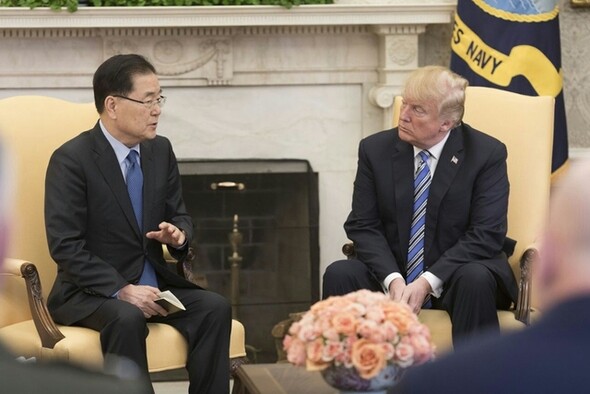hankyoreh
Links to other country sites 다른 나라 사이트 링크
[Editorial] Government must use KORUS FTA negotiations to minimize fallout from Trump’s steel tariffs

US President Donald Trump has finally detonated his trade bomb. On Mar. 8, he signed an executive order imposing high tariffs of 25% on imported steel and 10% on aluminum.
When Trump first announced his plans for the tariffs a week ago in a Mar. 1 meeting with US steel industry CEOs, China and the EU strongly protested the measures and warned of direct action in response. Many members of the US executive branch and Congress tried to dissuade him. National Economic Council director Gary Cohn, one of Trump’s top economic advisors, resigned in protest. The US media unanimously denounced the measure as toxic to the US economy. Trump paid no mind to any of it. His uncommunicative and dogmatic approach to governance is truly astonishing.
Many analysts have suggested Trump’s tariff bomb is meant as a maneuver for the midterm elections in November – a calculated bid to elicit support from the white working-class Rust Belt voters who make up his base by touting the increase in jobs resulting from import regulations. He is undermining the international trade order for the sake of an election win. This is deeply irresponsible behavior, exhibiting not a shred of the virtues that the leader of the world’s most powerful country should possess.
The EU is already preparing its own retaliatory tariffs targeting US steel, as well as such symbolic brands as Harley-Davidson, bourbon whiskey, and Levi’s jeans. China is mulling retaliatory measures against US soybeans, corn, and other crops. Trump has announced his plans for additional retaliation against this. A trade war has ignited, threatening to engulf the world economy in chaos.
The immediate effect of this for South Korea is a major blow to steel exports to the US. A Mar. 9 report by the Hyundai Research Institute on the “Significance of Trump’s Trade War” predicted annual South Korean steel exports to the US would fall by 21.9% and 14,000 jobs would be lost over the next three years.
There is still time for a last-ditch effort to persuade Trump. The US Commerce Department has said it will grant exemptions to countries with important security ties that can assuage the US’s fears about steel oversupply and other concerns before the tariffs’ Mar. 23 implementation date. Seoul needs to convince Washington that South Korean steel does not have a negative impact on the US’s security or economy. This calls for action not just from the government, but from private businesses as well.
If South Korea is not recognized as an exception, it will need to pursue restitution measures through a WTO complaint and other approaches. If we simply sit there and take our lumps, we stand to suffer even more abuse. A WTO complaint would also be more effective if lodged in conjunction with many other countries rather than single-handedly.
The steel tariffs also appear poised to impact the current negotiations to amend the South Korea-US Free Trade Agreement. The US is likely to use the steel tariffs as a means of turning the screws and gaining more concessions on automobiles and other areas of interest. South Korea needs to shut down the unreasonable demands from the US, crafting a careful response strategy to use the amendment negotiations as a way of minimizing damage to the steel sector.
Please direct questions or comments to [english@hani.co.kr]

Editorial・opinion
![[Editorial] Does Yoon think the Korean public is wrong? [Editorial] Does Yoon think the Korean public is wrong?](https://flexible.img.hani.co.kr/flexible/normal/500/300/imgdb/original/2024/0417/8517133419684774.jpg) [Editorial] Does Yoon think the Korean public is wrong?
[Editorial] Does Yoon think the Korean public is wrong?![[Editorial] As it bolsters its alliance with US, Japan must be accountable for past [Editorial] As it bolsters its alliance with US, Japan must be accountable for past](https://flexible.img.hani.co.kr/flexible/normal/500/300/imgdb/original/2024/0417/6817133413968321.jpg) [Editorial] As it bolsters its alliance with US, Japan must be accountable for past
[Editorial] As it bolsters its alliance with US, Japan must be accountable for past- [Guest essay] Amending the Constitution is Yoon’s key to leaving office in public’s good graces
- [Editorial] 10 years on, lessons of Sewol tragedy must never be forgotten
- [Column] A death blow to Korea’s prosecutor politics
- [Correspondent’s column] The US and the end of Japanese pacifism
- [Guest essay] How Korea turned its trainee doctors into monsters
- [Guest essay] As someone who helped forge Seoul-Moscow ties, their status today troubles me
- [Editorial] Koreans sent a loud and clear message to Yoon
- [Column] In Korea’s midterm elections, it’s time for accountability
Most viewed articles
- 1[Column] The clock is ticking for Korea’s first lady
- 2Samsung barricades office as unionized workers strike for better conditions
- 3[Editorial] When the choice is kids or career, Korea will never overcome birth rate woes
- 4Why Israel isn’t hitting Iran with immediate retaliation
- 5[News analysis] After elections, prosecutorial reform will likely make legislative agenda
- 6[Editorial] Does Yoon think the Korean public is wrong?
- 7S. Korea, Japan reaffirm commitment to strengthening trilateral ties with US
- 8[Editorial] As it bolsters its alliance with US, Japan must be accountable for past
- 9Japan officially says compensation of Korean forced laborers isn’t its responsibility
- 10Faith in the power of memory: Why these teens carry yellow ribbons for Sewol